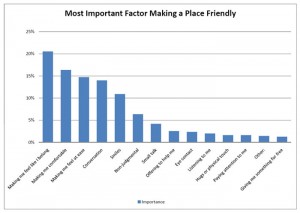Friendliness is over-rated — especially as it relates to churches. Of course,  grumpiness won’t win many hearts. And snobbery is only a virtue in Hollywood. Nevertheless, it is ultimately more important that churches articulate the Gospel than that they are friendly. Sure, friendliness can be a bridge to sharing our Message. But what does it matter that we smile, shake hands, and excel in the gift of gab, if we avoid the subject of sin and Christ’s remedy?
grumpiness won’t win many hearts. And snobbery is only a virtue in Hollywood. Nevertheless, it is ultimately more important that churches articulate the Gospel than that they are friendly. Sure, friendliness can be a bridge to sharing our Message. But what does it matter that we smile, shake hands, and excel in the gift of gab, if we avoid the subject of sin and Christ’s remedy?
Maybe that’s why Group Publishing’s (GP) recent survey, Is Your Church as Friendly as You Think?, so interests me. Here’s the bullets from the survey:
Key Findings
- Home is the friendliest place in town by a wide margin. Less than 18% of Americans define Church as the friendliest place in town as compared to only 24% of self-declared Christians.
- Outside of the home, Coffee Shops get it right when it comes to being friendly more often than the Church. 90.6% of overall responders rating Coffee Shops chose it as the friendliest place in town…
- The Mall, the Post Office and Auto Repair Shops scored at the bottom of each data set.
- Friends & Family are the friendliest people in town according to over 65% of Americans. Compared to a Minister or Religious Leader who comes in less than 10% of the time, and ranked behind a Neighbor and a Co-worker, and just ahead of a Service Attendant.
- No one seems to like Government Officials. They are the number-one rated least friendly person in town among all groups.
- Only 16% of Americans say Church is their favorite place to meet new friends, and that’s 2% points behind a Restaurant/Pub/Sports Bar at number one. Among Americans, Church only ranks 5% points higher than Online as their favorite place to make new friends.
- Christians need to feel like they belong before they call a place friendly. More Christians chose “Making me feel like I belong” as the number-one factor for making a place friendly.
There is much here worth considering (as well as some nifty graphs). But I wonder if the assumption itself is faulty. Should churches be the “friendliest place in town”? Again, this is not meant to insinuate that churches should be inhospitable, cliquish, or cold. Indeed, Jesus said that love should mark His followers. But “love” and “friendliness” are two different things. Friendliness is something that can be contrived, employed for ulterior motives. A car salesman can be exceptionally friendly, as can a guy trying to pick up a girl at the local club. (It’s only after the “sale” that you see both their true colors.) Heck, any store manager can demand, er, cultivate  friendliness in their reps. So my first thought is whether or not this assumption is misleading. Aren’t there other areas the church should excel in above friendliness?
friendliness in their reps. So my first thought is whether or not this assumption is misleading. Aren’t there other areas the church should excel in above friendliness?
It’s also interesting that, in the GP survey, the top two things that make people feel a place is friendly (see graph) are “making me feel like I belong” and “making me feel comfortable.” This sounds reasonable, but upon closer inspection, those expectations are fairly incongruous. Yes, as a community of sinners, churches should make me “feel like I belong.” Throughout Scripture, God invites “whoever is thirsty” to come. This magnanimity should pervade a Christian church. But a church that seeks to make people “feel like they belong” must inevitably make people “feel uncomfortable.”
In response to this poll, Mark Galli, senior editor for Christianity Today, writes:
When you belong to the fellowship of Christ, to the company of the committed, comfort is not the word that will describe your life.
You will find yourself worshipping with people who irritate you, people with whom you disagree, people you find difficult to forgive at times. But the very reason you put up with their flaws and stupidities, and they with yours, is that you both belong to a family you cannot escape.
Furthermore, you don’t really belong to a group until people feel free enough to tell you what they really think of you and free enough to talk about the deepest, most troubling realities.
In a place where people really belong, they are free to talk about the most uncomfortable things—sin and salvation, hate and forgiveness, suffering and hope, death and life. And they learn the fine art of forbearance and forgiveness. Merely friendly churches avoid such unpleasantness. But churches that take people seriously cannot avoid it.
Christians should love people. Bottom line. This should translate into friendliness. But make no mistake — the objective of any relationship should be to help others draw closer to God.
Spiritual growth cannot occur without confrontation and accountability, without being made “uncomfortable.” Yet, apparently, the average church-goer does not want this. They do not want people horning into their business and pressing them regarding their spirituality (or lack thereof). They want smiles, back slaps, and attaboys; they want to be told God loves them and has a terrific plan for their life. Which is why most people interpret a friendly church as being a non-confrontative church, a church that makes them “feel comfortable.”
Preaching the Gospel will inevitably make people feel uncomfortable. Churches that never make their members uncomfortable may be perceived as friendly, but they are not preaching the Gospel.














At the risk of taking these verses out of context…which I don't think they are…Jesus (and Paul) speak some oft-glossed-over words on just this subject:
Matthew 10:34
"Do not suppose that I have come to bring peace to the earth. I did not come to bring peace, but a sword."
Romans 13:4
"For he is God's servant to do you good. But if you do wrong, be afraid, for he does not bear the sword for nothing. He is God's servant, an agent of wrath to bring punishment on the wrongdoer."
In these verses, I see no reference to "I am here to make you feel comfortable". Also, using the biblegateway website, I return exactly THREE times the word "smile" shows up in the NIV — and all three are in Job…Maybe the results of the survey indicate that we are doing something RIGHT…
I don't KNOW…I'm just thinking out loud (so to speak…)